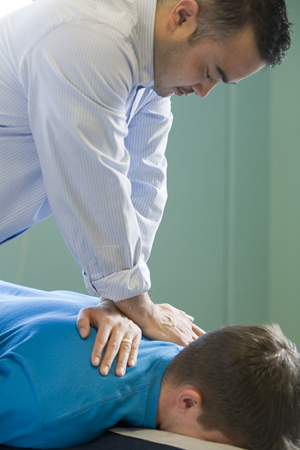Massage Therapy
Massage therapy is a way to increase circulation to tense, strained muscles and other soft tissue. Behind this treatment is the belief that improved circulation and relaxation lead to better health and well-being.

Healing through touch
Massage therapy can be used to increase blood flow, relax muscles, relieve stress, and revitalize the body. The method of massage that’s used depends on the goal. It may include vigorous kneading and rubbing. Or it may be a more subtle, gentle touch, such as light tapping.
Massage therapy may be done using a wide range of methods. The type you have depends on the massage therapist’s training as well as your preference. Here are some of the most common types of massage therapy:
-
Swedish massage. This type uses long strokes and kneading motions to relax tight muscles.
-
Sports massage. This type uses various methods to enhance athletic performance and aid recovery after exertion.
-
Oriental massage. This type applies pressure to specific points known to enhance the body’s own internal healing energy.
Why look for this care?
Massage therapy can ease many aches and pains you may get from activities of daily life, such as working in the yard to more strenuous activities such as running a half marathon. The pain treated with massage may be localized like lower back or neck pain. Or it may be linked to certain health conditions, (including some types of cancer).
No matter what is causing your pain, massage therapy may improve circulation and ease your pain. It may help you feel both relaxed and revitalized. Other benefits may include:
-
Improved joint motion
-
Lymphatic drainage
-
More energy
-
Better sleep
-
Lower rate of depression
-
Reduced stress
Questions for the massage therapist
Before you decide whether to get massage therapy, talk with a massage therapist. Asking them some of these questions may help you make an informed decision:
-
What is your training? Are you licensed, registered, or certified? How long have you been practicing?
-
What massage methods do you use?
-
Do you use any oils or lotions with the massage? If so, what do you use?
-
Have you treated problems like mine?
-
What can I expect on a typical visit?
-
How long will treatment take and how much will it cost?
-
Do I need to prepare in any way?
-
Will I need to undress?
-
Will my insurance pay for the therapy?
-
Are there any side effects or reasons not to have massage therapy?
-
How many sessions do you think I will need?
-
What will you advise if I don't see any improvement?
Online Medical Reviewer:
Diane Horowitz MD
Online Medical Reviewer:
Heather M Trevino BSN RNC
Online Medical Reviewer:
Tennille Dozier RN BSN RDMS
Date Last Reviewed:
12/1/2022
© 2000-2026 The StayWell Company, LLC. All rights reserved. This information is not intended as a substitute for professional medical care. Always follow your healthcare professional's instructions.